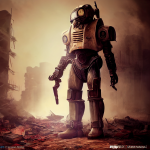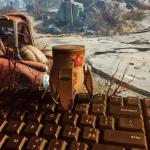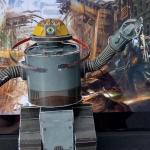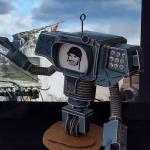Rozhovor s Michelem Faberem, část první
Článek od: veronikamah - 14.11.2016
V polovině října 2016 se díky nakladatelství Kniha Zlín a tvrdé práci Viktora Janiše dostal na pulty českých knihkupectví románMichela Fabera, Kniha zvláštních nových věcí. Autor, který nejen české publikum okouzlil románem Kvítek karmínový a bílý, se vrací s knihou, která je i není tak trochu sci-fi. Měli jsme tu možnost Michela Fabera při jeho pražské návštěvě na chvíli vyzpovídat. A ač se zdá, že třicet minut na rozhovor je doba krátká, autor se rozpovídal a interview tak nabylo velkých rozměrů, že jsme se rozhodli rozdělit jej do dvou částí.
Nejste už unavený? Jeden rozhovor za druhým…
Ono hodně záleží na novináři. Jestli se mě ptá na věci, které ho opravdu zajímají a chce o nich vědět více nebo jestli klade otázky, které by od něj čekal šéf.
Tak to doufám, že budou moje otázky pro vás alespoň trochu zajímavé :) Tento rozhovor je pro internetový portál Sarden.cz, který se zaměřuje převážně na sci-fi a fantasy. Je tedy jasné, že ve chvíli, kdy jsme se dozvěděli, že vychází „Kniha zvláštních nových věcí“, zaujala nás. Začněme povinnou otázkou – čtete sci-fi/fantasy?
Poslední dobou čtu jen literaturu faktu. Abych řekl pravdu, posledních 25 let čtu čím dál méně beletrie. Ne že bych nechtěl číst sci-fi, ale prostě jsem se rozhodl nečíst beletrii jako takovou. Když jsem byl mladší a četl jsem hodně, bylo v tom mnoho sci-fi knih.
Zavzpomínejme na to mládí. Jaká kniha Vás chytla, zaujala a jednoho dne se k ní plánujete vrátit?
Tak jednu knihu jsem četl šestkrát nebo sedmkrát, to je u mě hodně neobvyklé. Obvykle čtu každou knihu jenom jednou. Nebo si dokonce přečtu jen pár kapitol, odstavců, abych pochopil, kam autor s příběhem směřuje. Ale román „Devět princů Amberu“ od Rogera Zelaznyho… Netuším, proč je pro mě tak zajímavá, že se k ní jednou za čas vrátím…
VJ: Jen tenhle díl, nebo myslíš celou ságu Amber?
Četl jsem druhý i třetí díl, ale ty už nebyly tak dobré. A bylo mi řečeno, že série má přes 10 dílů a kvalita jde knihu od knihy jenom dolů. A to nemám zapotřebí.
Myslím si, že pokud dáváte přednost jednomu žánru, ať už je to sci-fi, fantasy, červená knihovna nebo thriller, přečtete si knihu a ona vám dá tu konkrétní ingredienci, kterou v daném žánru hledáte, tak i kdyby vás zbytek knihy hodně zklamal... Je to stejné, jako když někdo platí za sex a dostane jen to minimum, za které zaplatí. Já netrpím žádnou závislostí na žánru. Pokud se tedy začtu do žánrového románu, který nefunguje na všech úrovních a nepřináší mi potěšení v mnoha dalších ohledech a dostávám jen to nutné minimum, pak ztrácím motivaci pokračovat ve čtení.
A přesně tak jsem cítil při čtení série Amber. Ale první díl mám opravdu rád. Jednoho dne bude muset někdo analyzovat, proč pro mě tolik znamená :). Považovala byste knihu „Jatka č. 5“ od Vonneguta za sci-fi román? Já bych řekl, že je to sci-fi - kvůli vzpomínkám Billyho Pilgrima na cesty na planetu Tralfamador. Jsou to sice bludy způsobené posttraumatickou stresovou poruchou, kterou si odnesl z války, ale vy můžete ty vize při čtení vnímat jako skutečné, a díky tomu je román v jistém ohledu i sci-fi.
Je výborné, že jste načal toto téma. „Kniha zvláštních nových věcí“ je všeobecně všemi považována za sci-fi román. Ale když knihu dočtete, dojde vám, že jediným sci-fi prvkem knihy je to, že se děj odehrává na jiné planetě. Kniha je ale úplně o něčem jiném. Jak se stavíte k tomu, že je „Kniha zvláštních nových věcí“ řazena jako sci-fi, i když to není tak úplně pravda?
Můžeme se na to podívat ze dvou stran.
Jsou lidé, kteří milují sci-fi a zároveň jsou i sofistikovanými čtenáři. Ti zastávají názor, že bychom měli rozšířit definici sci-fi jako takovou. Stejně tak věří, že je velmi neuctivé ke sci-fi jako médiu, diskvalifikovat jakoukoli knihu ze žánru sci-fi, jakmile je příliš dobře napsána. Autoři seriózní literatury často používají sci-fi prvky a scénáře, ale popírají, že by jejich román mohl být sci-fi. Snaží se zachovat si postavení autora seriózní literatury. Sci-fi nepíší, jen používají prvky sci-fi. Je to, jako když Bill Clinton říkal: „Nešlukoval jsem“ nebo „Kouření není opravdový sex“. „Kniha zvláštních nových věcí“ je sci-fi. Hlavní hrdina vyráží na neznámou planetu. Ale tam končí, nenajdete v ní další aspekty mainstreamové sci-fi.
Mám radost, že si lidé „Knihu zvláštních nových věcí“ zařadili jako sci-fi. Byl bych ale nerad, kdyby si ji kvůli tomu nepřečetli lidé, kteří sci-fi neholdují. Romány, jako je tento nebo Pod kůží, se s tímto problémem často potýkají. Hrozí jim, že jaksi propadnou roštem. Milovníci sci-fi budou tvrdit, že jim kniha nedává to, co od sci-fi románu vyžadují. A naopak čtenáři, kteří hledají emocionálně hluboké knihy, zase od ní dají ruce pryč, protože je to román o chlápkovi, který cestuje na jinou planetu. A oni přece sci-fi nečtou.
A tím vzniká nebezpečí, že se román stane knihou, která se mezi lidi dostane jenom tak, že si ji čtenáři budou předávat mezi sebou. Jeden bude říkat druhému: „Věř mi. Neptej se mě, o čem kniha je. Jsem tvůj kamarád, věříš mi jako čtenáři, tak si to prostě přečti.” A pokud je toto jediná cesta, jak se román může šířit po světě, no, je to zdlouhavý proces.
©Eva Yourenová
VJ-VM: Tvrdil bys jako Margaret Atwoodová: „Toto není sci-fi, ale spekulativní beletrie.“?
Rozhodně bych neprohlašoval „Knihu zvláštních nových věcí“ za spekulativní beletrii. Nelíčím, jak bude společnost vypadat za několik let. Ponoukám čtenáře, aby přemýšleli o vlastním těle, vzpomínkách, lidech, které milují a jak s nimi komunikují. Nic z toho není spekulace. Je to tady a teď.
Budoucnost společnosti mě zajímá, vždyť v ní budu žít. Ale „Kniha nových zvláštních věcí“ o tom není.
Třeba Vám Kniha zvláštních nových věcí díky řazení mezi sci-fi získá nové čtenáře. Lidé, kteří nechtěli číst „Kvítek Karmínový a bílý“, mu teď možná dají šanci, protože už vědí, jak píšete.
Vaše psaní má neuvěřitelný rozsah. V jednom příběhu představujete viktoriánskou prostitutku, druhý je zasazen do zcela nového světa. Kam chodíte na nápady? To se jednoho dne vzbudíte a prostě si řeknete, že napíšete knihu o chlápkovi, co se vydá na neznámou planetu?
Začínám s pocitem, který si z knihy máte odnést. Přemýšlím nad tím, jak byste měla vnímat sebe samu sebe a komunikaci s lidmi, které máte ráda a tak dále. A pak teprve přicházím na to, jaký příběh tě k těm pocitům přivede. Jdu tedy pozpátku, od duchovního a emociálního stavu, do jakého vás chci četbou uvést. Chci tedy ve vás něco vyvolat, ale zároveň to chci udělat cestou, která vás bude zároveň bavit i podněcovat.
Zrovna před chvíli jste použil slovo „duchovní“. Přesto, že se o vás ví, že jste ateista, v „Knize zvláštních nových věcí“ kladete obrovský důraz na náboženství. Jak se to stalo, že je víra tak důležitou součástí románu?
Vyrostl jsem v silně křesťanské rodině. Vyznával jsem baptistickou víru, o niž jsem ale někdy v jedenácti nebo dvanácti letech přišel. Víru tedy znám. Jako teenager jsem si nějakou dobu myslel, že všechny světové problémy by vyřešilo, kdybychom zlikvidovali všechna náboženství a zbavili se pověr a víry. Díky tomu by se z lidí stala vyšší forma existence, která by byla schopna více fungovat na rozumu.
To se ale asi lidstvu nepodaří. Nejsme na to vybavení. Myslím si, že jsme docela nevyvinutá zvířata, extrémně pověrčivá, která mají hrůzu ze smrti. Hrůzu ze ztráty. Hrůzu z nemoci… Věřím, že potřebujeme systémy víry, které nám umožní vlastní víru popřít.
Takže místo toho, abych byl naštvaný, že jsme, co jsme, zaměřil jsem se na to, že nás, lidi, vnímám jako malé duše. Takové dušičky, které si jezdí v malých autíčkách z masa a kostí. Ta jsou sice super, ale nejsou trvanlivá. Každý z nás se nějak po svém musí vyrovnat s tím, že během pár krátkých let můžeme ztratit úplně všechno a budou z nás zase jenom atomy. Náboženství je dle mého děsivé a absurdní, ale také krásné, smutné a dojemné. A „Kniha zvláštních nových věcí“ se snaží všechno tohle ukázat.
Pokračování příště...
Rozhovor přinášíme pro anglicky mluvící i v originále:
Are you not tired? One interview after another?
It largely depends on whether the person is asking things they are interested in and they really want to know or whether they are asking the questions because they feel their boss would say: You must ask this.
I hope, my questions will be them at least a bit interesting. Just so you know where I am coming from. I am representing internet portal sarden.cz, it focuses mainly on sci-fi/fantasy books. So when “The book of strange new things” came out, of course we were interested in it. So, obligatory question as we are sci-fi/fantasy portal - do you read sci-fi/fantasy?
Well, I read almost only non-fiction these days. In fact, last 25 years or so, I have read less and less fiction. So, it is not that I am choosing against reading sci-fi, but I am choosing against reading fiction. When I was younger and reading a lot, I read a lot of science fiction.
So lets look back to these “young years”, is there any book that caught you, made you think about it or maybe one day you plan to read it again?
Yes, there is a book which I read six or seven times which is very unusual for me. Because usually I only read a book once or I just read a few pages to learn what I can about the book. But this book, Nine princess of Amber by Roger Zelazny and I do not know why it speaks to me so much but I return to that book every few years. And, let me think…
VJ: Is it just that book, or whole Amber cyclus?
I read the second and third installment, shall we say and they are already declining in quality. And I am told and it is many more, 10 or so, and they are declining in quality even more. And I do not need to go on that spiral.
I think, one of the differences between. I think if you have very strong appetite for one genre, be it science fiction or fantasy or romance or thriller, you can read a book and it gives a certain ingredient you are looking for and even if everything else about it is very disappointing… It is like having businessman paying for the sex, this is like a minimum thing you are paying for. And because I do not have that addiction to the genre, if I start reading a genre novel and it is not working on all level and it not giving me pleasure in many ways, it is just supplying bare minimum, then I do not have a motivation to continue.
And that how I felt very quickly about Zelazny cycle. But I do love that first book. One day, someone will have to analyze why it means so much to me :). And I do not know if you regard Slaughterhouse 5 as a sci-fi novel. Apparently, it is, because Billy Pilgrims’ memories of visiting the planet Tralfamadore. I believe delusions that come from his post-traumatic stress disorder from experiences in the war, you can read those visions literally and it does become kind of science fiction.
It is actually great that you started this topic. Generally “The Book of strange new things” is well, people consider it as a sci-fi novel. But when you read the book, when you finish it, you realize that only aspect of sci-fi is that it happens in the other world but the book entirely about something else. So, how do you feel about “The Book of strange new things” being classified as a sci-fi, even though it is not true at all.
Well, there are two arguments about that.
People who love science fiction and who are sophisticated readers feel that we should expand what definition of sci-fi is and also that it is very disrespectful to sci-fi as a media to disqualify any book from being science fiction as soon as it is too well-written. What you often find with serious literature writers who use sci-fi scenarios is that they deny it is science fiction because they do not want to be put in science fiction gather and they try to preserve the status as a serious author by saying they are not writing sci-fi, they are using science fiction props. It is like Bill Clinton saying “I did not inhale” or “Cock-sucking is not a real sex”. It is, you know, “The Book of strange new things” is a science fiction. The guy goes to completely different planet. It just does not deliver, it does not offer the thoughts of things that most mainstream science fiction offers.
I am very happy to have the book classified as a sci-fi. As long as that does not stop readers who do not read sci-fi to actually read the book. That is big problem with the books like “The Book of strange new things” and book like “Under the skin”. There is a danger that it will fall between two stalls. People who love sci-fi will say: “the things I want from sci-fi, this book is not giving me”. And then the people who want emotionally compelling profoundly moving books will not read it because it is about a guy who goes to another planet and they say: “That’s science fiction. I do not read science fiction.”
And then the danger here is that it is a book that can only be passed from one reader to another. One reader saying: “Trust me. Donť ask me what this book is about. Don’t ask what the genre is about. I am your friend, you trust me as a reader, just read the book.” And if that is the only way how can the book make its way around the world than it will be a very slow process.
VJ-VM: Would you go on a Margret Attwood defense saying: “This is not science fiction, it is actually speculative fiction.”
I certainly would not call “The Book of strange new things” a speculative fiction. Because I am really not predicting what society will be like in a few years from now. I am inviting people to think about their bodies and their memories and who they love and how they communicate with who they love. None of that is speculative, it is totally here and now. And it is very emotionally grounded.
I am interested in the future of the society because I am going to live in the society of the future. But that is not what the book is about.
Actually “The Book of strange new things” can bring you a new audience, because it is classified as a sci-fi. Now people who would not go for “Crimson petal novel” might now go for it, because they experience your writing. So maybe it is really not such a bad thing for it to be classified as a sci-fi :)
Anyway, you have incredible range when it comes to your writing. One story introduces Victorian prostitute, the other one is set in the whole new world. Where do these ideas come from? Do you just wake up one day and write a book about guy goes on completely new different planet?
What I begin with is how I want you to feel about being alive in the world. How I want you to feel about yourself and communication with people you love and so. And when I figure out what story I can invent that makes you feel that way, so I go backwards from this spiritual and emotional state that I want you to be in. So I want to do something to you but I want to do it in a way that entertains and stimulates you.
You used the word “spiritual” seconds ago. You are known to be an atheist but there is such a strong emphasis on the religion in the book. How did that happen? Because faith has really important part in the book.
Well, I grew up in quite an energetic christian family. I was a Baptist and I lost my faith when I was maybe 11 or 12. So I have that in my background. And I went through a phase, when I was a teenager, thinking that worlds problems could be fixed if we just knocked down all the churches and got rid of superstitious beliefs. And we would all then evolve into the higher form of being operating on more rational principles.
I don't think that is going to happen to human being. I don't think we’ve got the equipment for that. I think we are quiet unevolved animals and extremely superstitious, extremely frightened of dying. Frightened of loss. Frightened of illness. And… I think we need belief systems that allow us to deny our faith.
So instead of getting angry about that, I started to find it more and more moving, more and more poignant, that we are these little spirits. Little spirits riding around in these little vehicles of flash and that is really cool but that is not durable. And each of us needs to find a way to be okay with the fact that we can loose all that just in a few short years and become atoms again. And I find religion horrifying and absurd and also beautiful and sad and moving. And “The Book of strange new things” tries to do justice to all of those things.
to be continued...
Děkujeme Viktorovi Janišovi za pomoc s překladem
Zdroj fotografií: Eva Yourenová
Druhou část rozhovoru najdete zde.
- 6026x přečteno






























Přidat komentář